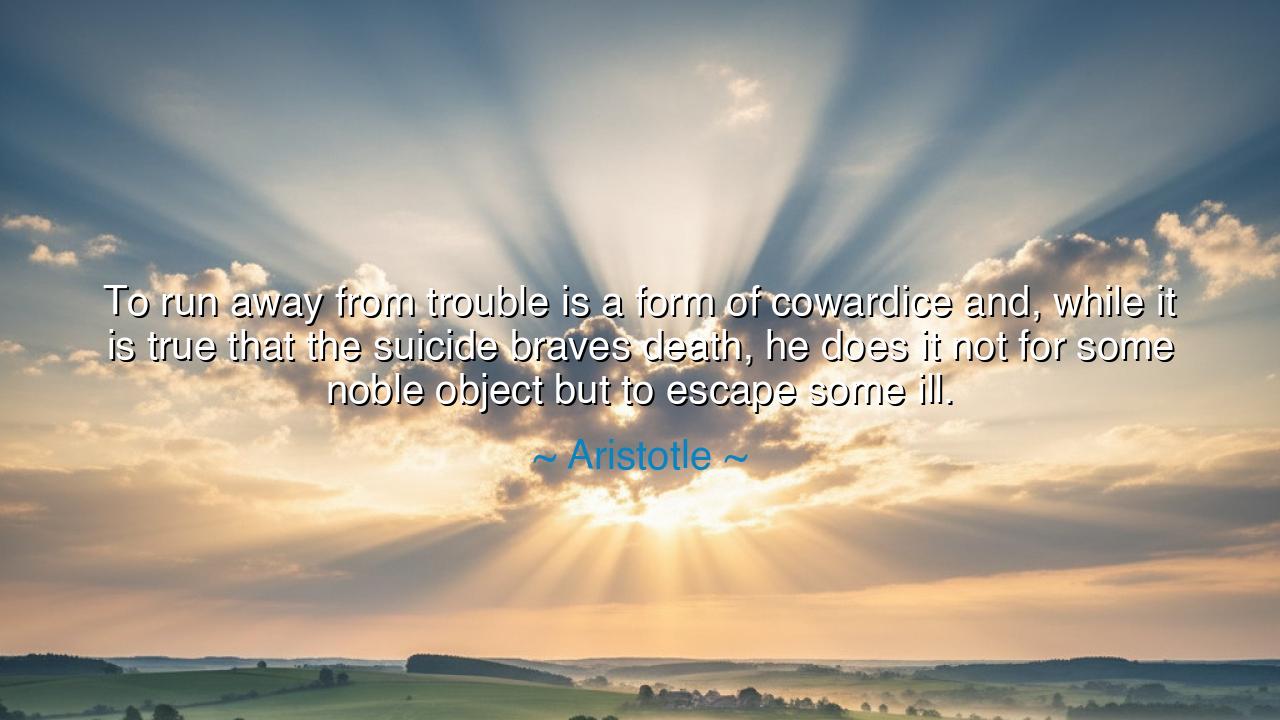
To run away from trouble is a form of cowardice and, while it is
To run away from trouble is a form of cowardice and, while it is true that the suicide braves death, he does it not for some noble object but to escape some ill.






In the solemn and piercing words of Aristotle, the philosopher of reason and virtue, there lies a timeless truth: “To run away from trouble is a form of cowardice and, while it is true that the suicide braves death, he does it not for some noble object but to escape some ill.” These words, born in an age when wisdom was carved into the hearts of men through discipline and reflection, remind us of the difference between courage and despair, between enduring life’s suffering and fleeing from it. Aristotle, the student of Plato and the teacher of Alexander the Great, sought to understand not only the laws of nature but the moral fabric of the human soul. In this teaching, he reveals that true bravery lies not in facing death, but in confronting life.
The origin of this quote can be traced to Aristotle’s ethical writings, where he explored the nature of virtue and the meaning of moral strength. For him, virtue was always the golden mean — the balance between excess and deficiency. Courage, therefore, is not the absence of fear, but the mastery of it. To flee from hardship, to surrender to despair, or to seek escape from suffering by destroying oneself — these, he said, are not acts of courage, but of imbalance, of soul weakened by pain. In his view, the noble man faces his troubles with steadiness, not because life is easy, but because endurance itself is the mark of the virtuous.
In his distinction between suicide and bravery, Aristotle touches upon the eternal paradox of human suffering. The man who takes his own life, he says, does indeed face death — but not for honor, not for justice, not for the good of others. He faces it only to escape the burden of his own anguish. Thus, the act is not heroic, but tragic; not born of greatness, but of despair. For courage must have a purpose higher than the self — it must aim toward something beyond comfort, beyond fear. To die for one’s country, for truth, or for love — these are deaths of meaning. But to die merely to escape pain is to deny the sacred possibility that pain itself can be transformed into wisdom.
History offers many examples of those who faced trouble with courage, and thereby gave their suffering purpose. Consider Socrates, the teacher of truth, who was condemned to death by his city. He could have fled into exile, could have escaped his sentence as many urged him to — but he did not. He drank the poison calmly, saying that he must obey the laws of Athens even when wronged by them. His courage was not in dying, but in dying for virtue, for the truth he had lived by. In his death, he triumphed over fear and proved Aristotle’s teaching: that to endure one’s fate with honor is greater than to flee from it in despair.
Aristotle’s words also reflect his belief in the purpose of suffering. To live is to struggle; to struggle is to grow. The man who flees hardship denies himself the chance to be strengthened by it. Life, in its trials, forges character as fire forges steel. Just as the sailor cannot become skilled without storms, so too the soul cannot grow wise without pain. Therefore, to run away from trouble is to refuse the education of the heart. It is to step aside from the path that leads from ignorance to wisdom, from weakness to virtue. The noble soul, Aristotle teaches, must learn to bear the weight of sorrow until it becomes strength.
In the modern world, this lesson remains as urgent as ever. Surrounded by comfort and distraction, many seek to escape discomfort rather than confront it. But peace does not come from avoidance; it comes from understanding. To face life’s pain with dignity, to transform suffering into compassion, to meet adversity with patience — this is the courage that Aristotle speaks of. He calls us to live deliberately, to endure with purpose, and to find meaning even in our trials. The one who does so rises above fear, above despair, and walks the path of true virtue.
Therefore, my children of thought and endurance, remember this sacred teaching: do not run from trouble. Stand before it as the warrior stands before the storm — not in defiance of death, but in affirmation of life. When sorrow comes, face it. When hardship strikes, endure it. For every pain you master becomes a source of wisdom; every challenge faced with courage becomes a seed of greatness. As Aristotle teaches, bravery is not found in fleeing suffering, but in transforming it — and thus, in choosing life, even when life wounds you.
For in the end, it is not death that tests a man’s valor, but life itself. The coward flees; the wise endure. And those who endure not only survive — they transcend.






AAdministratorAdministrator
Welcome, honored guests. Please leave a comment, we will respond soon